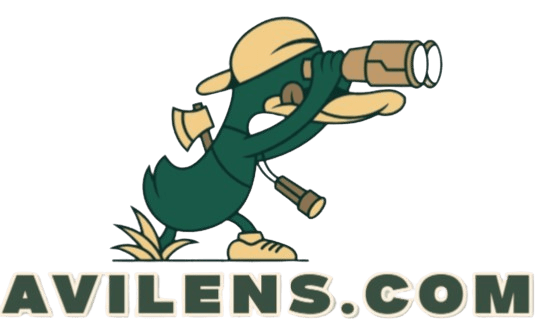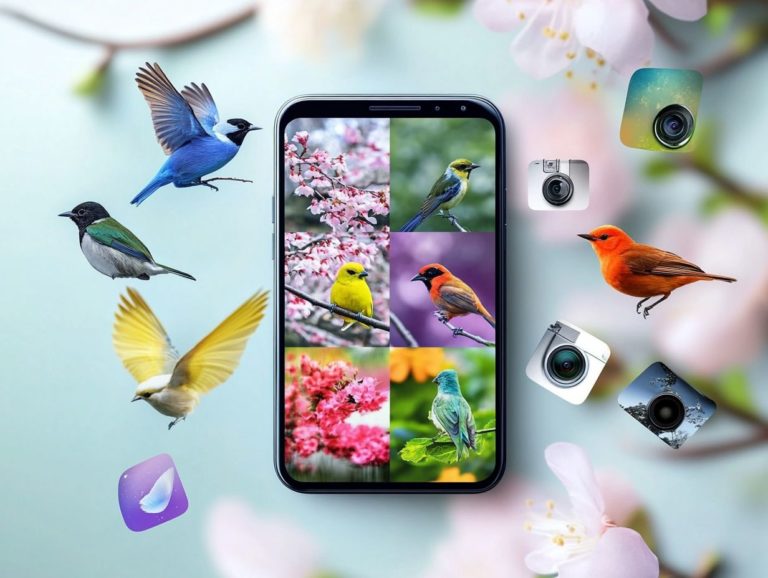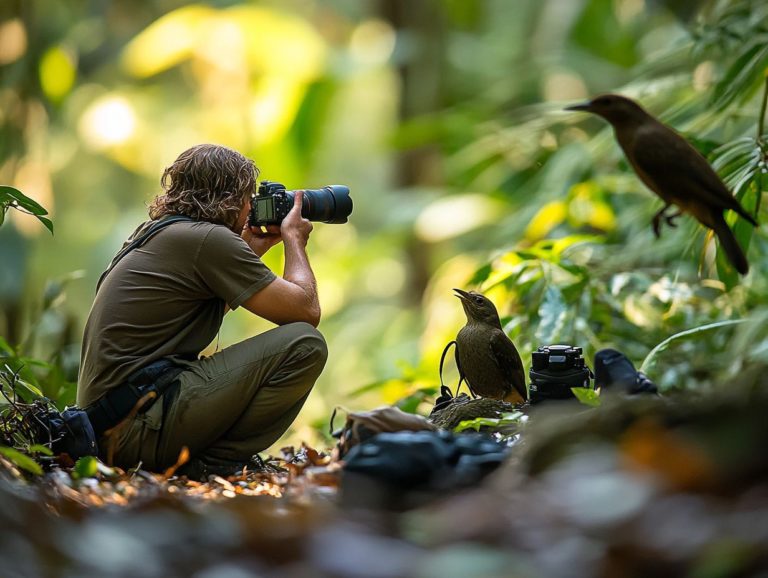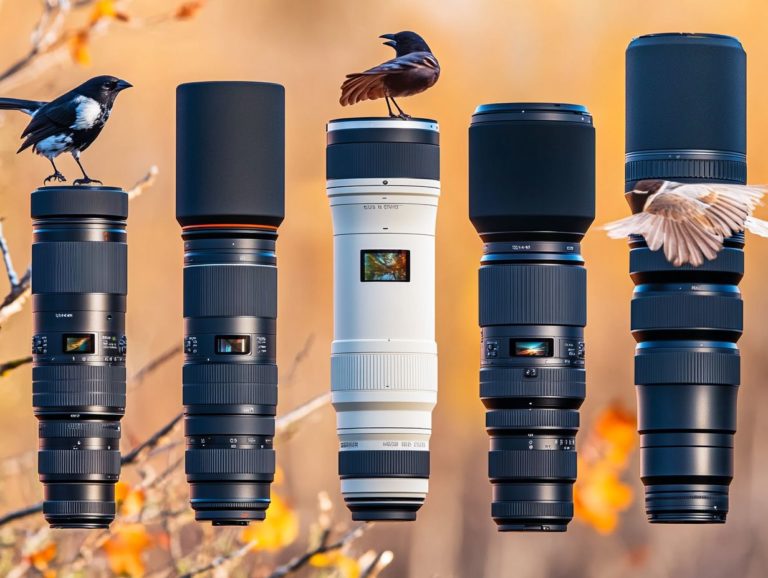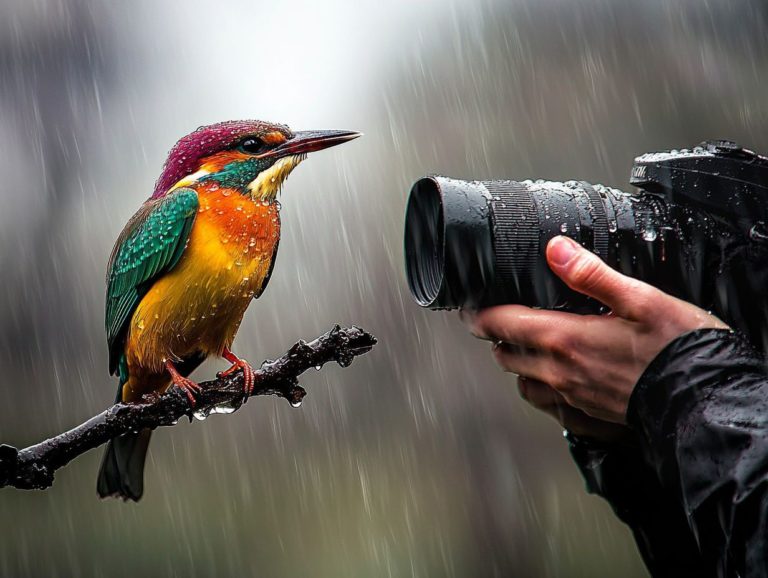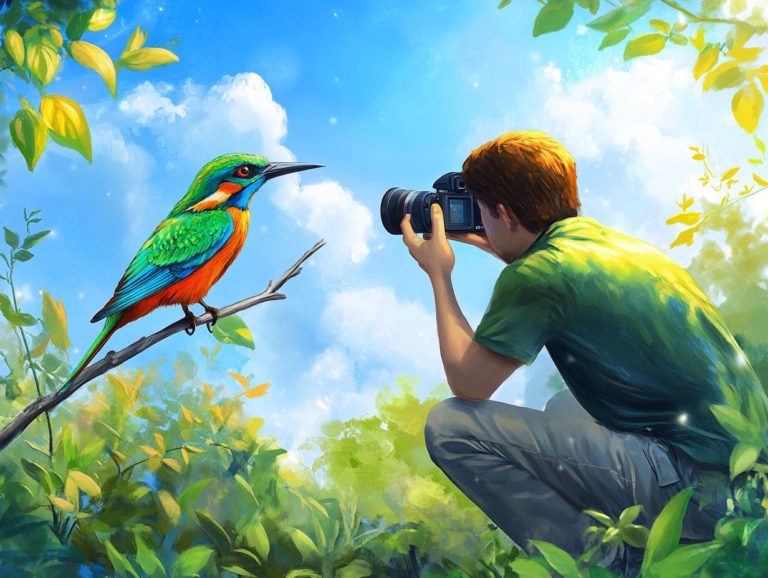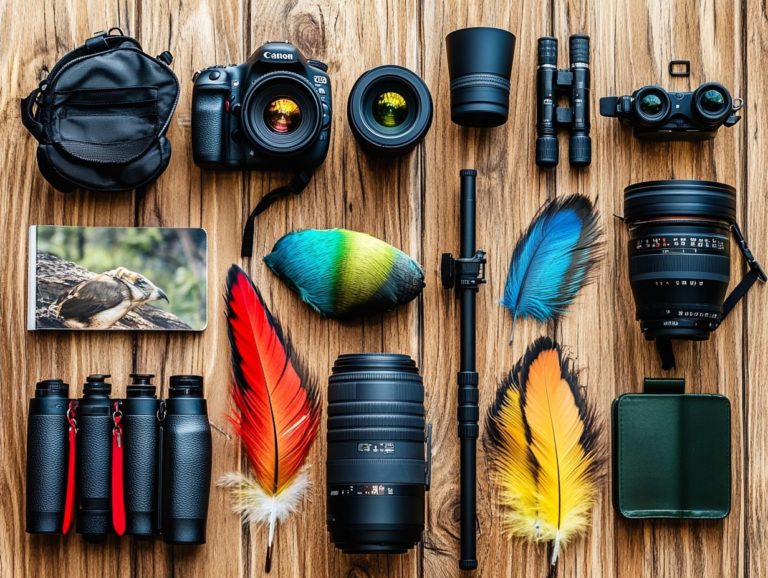Wildlife Photography Workshops: A Guide
Attending a wildlife photography workshop can truly transform your approach, whether you’re just starting out as a beginner photographer or have years of experience.
These workshops offer opportunities to sharpen your skills, master essential techniques, and expand your professional network.
This guide will help you navigate the selection process, prepare effectively, and make the most of your wildlife photography experience during the event.
You will discover ways to apply your new knowledge and share your wildlife images for valuable feedback. Get ready to elevate your wildlife photography journey!
Contents
- Key Takeaways:
- The Benefits of Attending a Wildlife Photography Workshop
- Choosing the Right Workshop for You
- Preparing for a Wildlife Photography Workshop
- During the Workshop
- Post-Workshop: Applying What You’ve Learned
- Frequently Asked Questions
- What is a wildlife photography workshop?
- Who can attend a wildlife photography workshop?
- What can I expect to learn in a wildlife photography workshop?
- Do I need to have expensive gear to attend a wildlife photography workshop?
- Are wildlife photography workshops only for photographers?
- How do I choose the right wildlife photography workshop for me?
Key Takeaways:
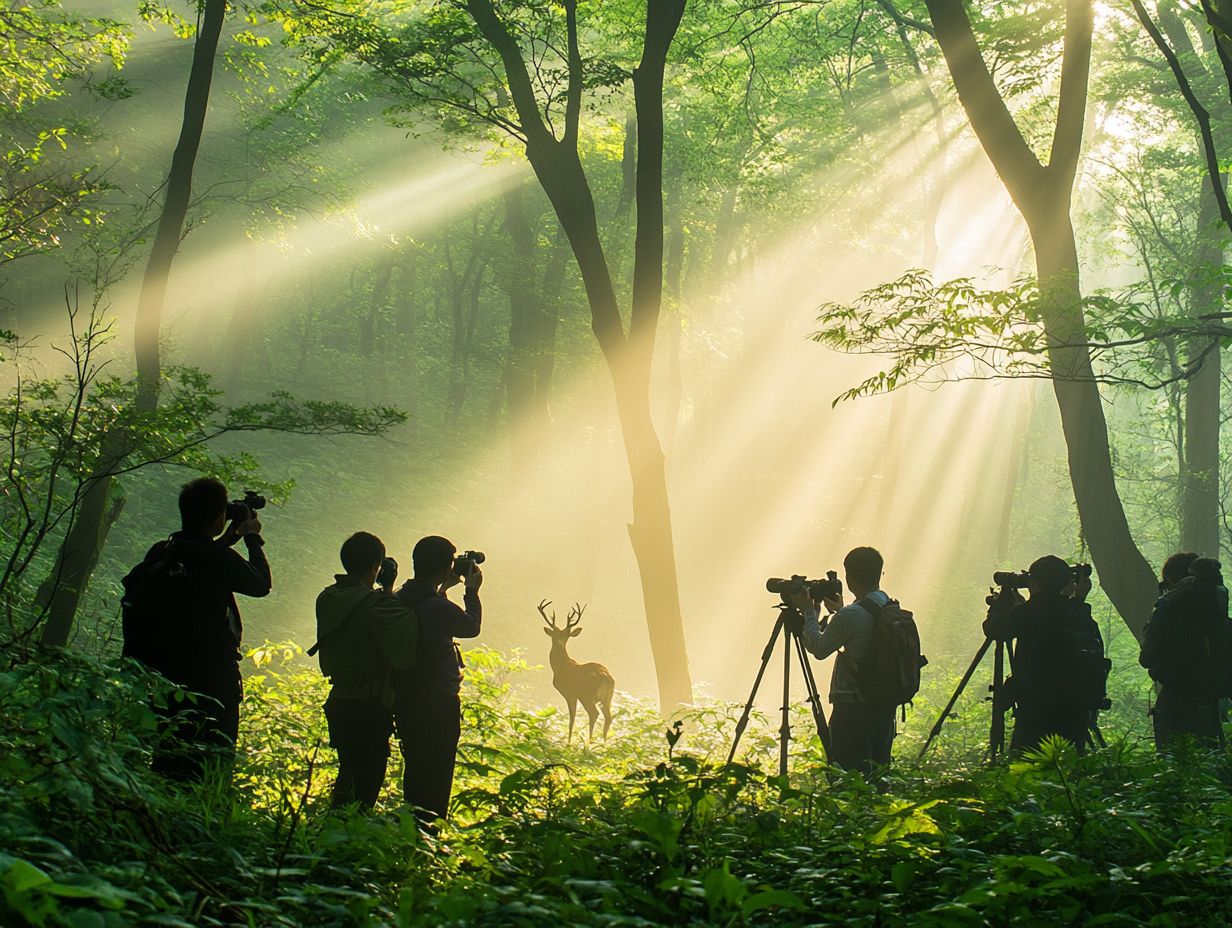
- Improve your photography skills and techniques, such as composition and style, by attending a wildlife photography workshop.
- Take advantage of networking opportunities at workshops to connect with other photographers and learn from their experiences.
- Consider factors like location, the expertise of local guides, and workshop format when choosing the right workshop for you.
The Benefits of Attending a Wildlife Photography Workshop
Attending a wildlife photography workshop presents a wealth of opportunities, especially for those keen on improving their craft in stunning locations like Yellowstone National Park or the Maasai Mara.
In these immersive experiences, you can enhance your photography skills by learning from local guides who know the best photo opportunities across diverse habitats.
The combination of professional instruction, hands-on practice, and a commitment to ethical photography makes these workshops essential for nature photographers at any stage whether you re a beginner adjusting your camera settings or an intermediate photographer perfecting your advanced techniques.
Improving Your Skills and Techniques
Improving your skills in wildlife photography is a key reason for attending a workshop, where expert instructors share invaluable insights into how to adjust your camera for different light conditions and photography techniques for capturing wildlife.
By engaging in hands-on experiences, you can refine your composition skills, learning to frame shots that evoke emotion and highlight the beauty of nature during wildlife watching.
Practical applications of different lighting techniques such as using natural light during those enchanting golden hours or mastering flash photography for nocturnal subjects will enhance your adaptability in any environment.
Understanding animal behavior and employing techniques like patience and stealth will help you get closer to wildlife without disturbing them, leading to authentic and breathtaking portraits. A well-rounded approach that blends both theory and practice sets the stage for truly captivating wildlife imagery.
Networking Opportunities
Networking opportunities flourish at wildlife photography workshops, where passionate individuals come together to share experiences and learn from one another in diverse ecosystems.
These gatherings enhance your skills through photography courses and hands-on experiences while cultivating a community where friendships can blossom. You ll find yourself exchanging invaluable insights and techniques, opening doors for exciting collaborations on future wildlife tours.
As you navigate shared challenges and celebrate joyful moments, you might discover partners for your next big project, whether it s a joint expedition or co-hosting a photography exhibit on unique wildlife locations.
The relationships formed in such an environment can lead to enduring partnerships, enriching your overall photography journey. The connections made in the field can evolve into creative endeavors, adding depth to your portfolio as you continue to explore and capture the beauty of wildlife.
Join a wildlife photography workshop today and start capturing breathtaking images!
Choosing the Right Workshop for You
Selecting the perfect wildlife photography workshop is essential for crafting a rewarding experience that resonates with your unique interests in wildlife locations. Whether you are captivated by the extraordinary wildlife of the Maasai Mara, the breathtaking vistas of Yellowstone National Park, or the majestic landscapes of Antarctica, the right choice can transform your experience!
Many workshops are available globally. It’s important to consider several factors: the knowledge of local guides, the diversity of wildlife locations you ll explore, and the overall photography experiences provided. Also, think about your skill level whether you re a budding photographer or an intermediate photographer seeking to refine advanced techniques to ensure you choose a workshop that truly caters to your needs.
Factors to Consider
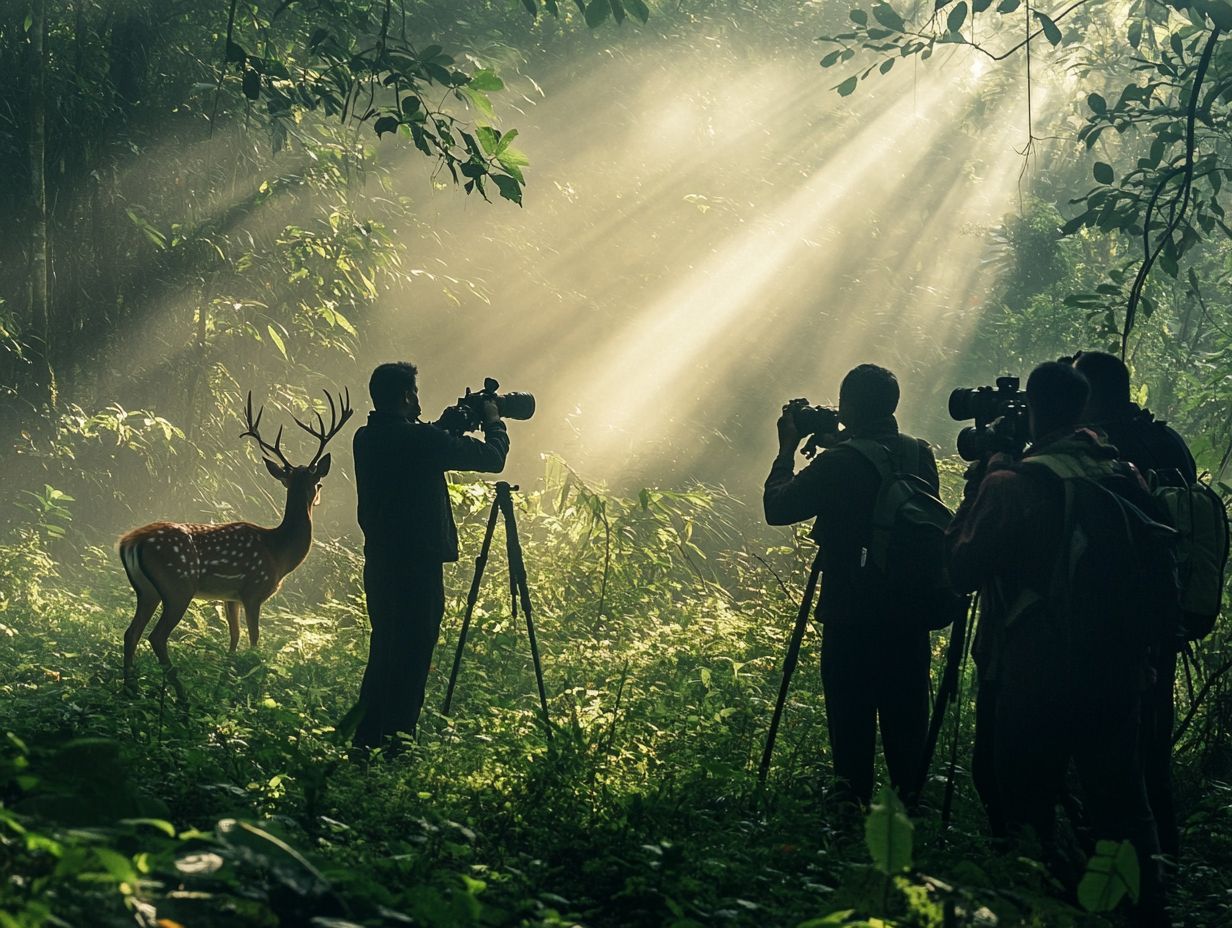
When deciding on which wildlife photography workshop to attend, consider several key factors, including your camera gear and the research locations outlined. Think about the type of camera gear you’ll need, the specific research locations focused on, and the emphasis on ethical photography practices that respect wildlife species.
Understanding migratory patterns is crucial, as these patterns dictate the availability of subjects throughout the year, impacting your wildlife watching opportunities. This knowledge greatly influences your creative options during the workshop. Familiarity with breeding seasons is equally important; it allows you to capture unique and intimate moments, like courtship displays or the nurturing of young wildlife, leading to stunning images that tell a story.
Don’t forget to consider seasonal weather variations. Workshops held in different climates can provide a range of experiences, from the vibrant sunsets of summer migrations to the serene beauty of winter landscapes that reflect diverse wildlife habitats. Each of these elements weaves together to create a meaningful learning experience, enhancing your technical skills and deepening your appreciation for wildlife, its populations, and its preservation.
Preparing for a Wildlife Photography Workshop
Preparing for a wildlife photography workshop requires meticulous planning to ensure you have the right photography equipment and a clear understanding of what to bring for an optimal outdoor photography experience.
You ll need essential photography equipment, including a DSLR or mirrorless camera (a type of digital camera) paired with telephoto lenses (lenses that allow you to capture distant subjects), as well as clothing suitable for the seasonal weather conditions you may encounter in various wildlife habitats, enhancing your nature experiences.
Mastering your camera’s features and fine-tuning your photography skills beforehand can greatly elevate your ability to capture breathtaking wildlife images during the workshop, whether using a mirrorless camera or a DSLR camera.
What to Bring and What to Expect
Knowing what to bring is crucial for a great wildlife photography workshop experience. Focus on your camera gear and outdoor photography techniques that respect wildlife ethics.
Pack a sturdy DSLR or mirrorless camera. Include a versatile range of lenses, such as standard and wide-angle options.
A telephoto lens is invaluable for distant subjects. A wide-angle lens will frame breathtaking landscapes perfectly.
Don t overlook essential accessories like tripods, extra batteries, and memory cards. These items are key to ensuring seamless shooting in various conditions and maximizing your photographic opportunities.
Comfort is essential. Consider padded camera bags, weather-resistant jackets, and sturdy footwear for your wildlife tours.
The workshop schedule includes outdoor photography sessions that feature:
- Early morning excursions for perfect lighting.
- Hands-on sessions focused on composition and settings for capturing wildlife.
- Evening critiques designed to refine your photography techniques.
Throughout this journey, the collective aim is to master the art of capturing stunning wildlife images that tell powerful stories about nature’s beauty.
During the Workshop
During the workshop, you will immerse yourself in a dynamic learning experience designed to elevate your photography skills and enhance your understanding of wildlife behavior. You ll receive personalized instruction tailored specifically to your interests whether you’re honing your eye for composition and style or looking into advanced techniques for capturing stunning wildlife images.
Tips for Maximizing Your Learning Experience
To truly elevate your learning experience during a wildlife photography workshop, consider adopting strategies that will refine your photography skills and optimize the use of your camera settings while immersed in nature and observing wildlife.
Embrace feedback from seasoned photographers. Their constructive criticism on your technique and composition can illuminate blind spots that you might not even realize exist.
Practicing patience as you observe animal behavior is essential. Waiting for that perfect moment can lead to stunning shots that authentically capture the essence of wildlife and enhance your portfolio.
Don t hesitate to experiment with various camera settings. Adjusting ISO for different lighting scenarios or utilizing burst mode to keep up with fast-moving subjects can make a significant difference in your results.
Getting familiar with your gear, whether it s a telephoto lens for those intimate close-ups or a sturdy tripod for stability, will enhance your adaptability to the ever-changing environments you’ll encounter during the workshop where wildlife populations thrive.
Post-Workshop: Applying What You’ve Learned
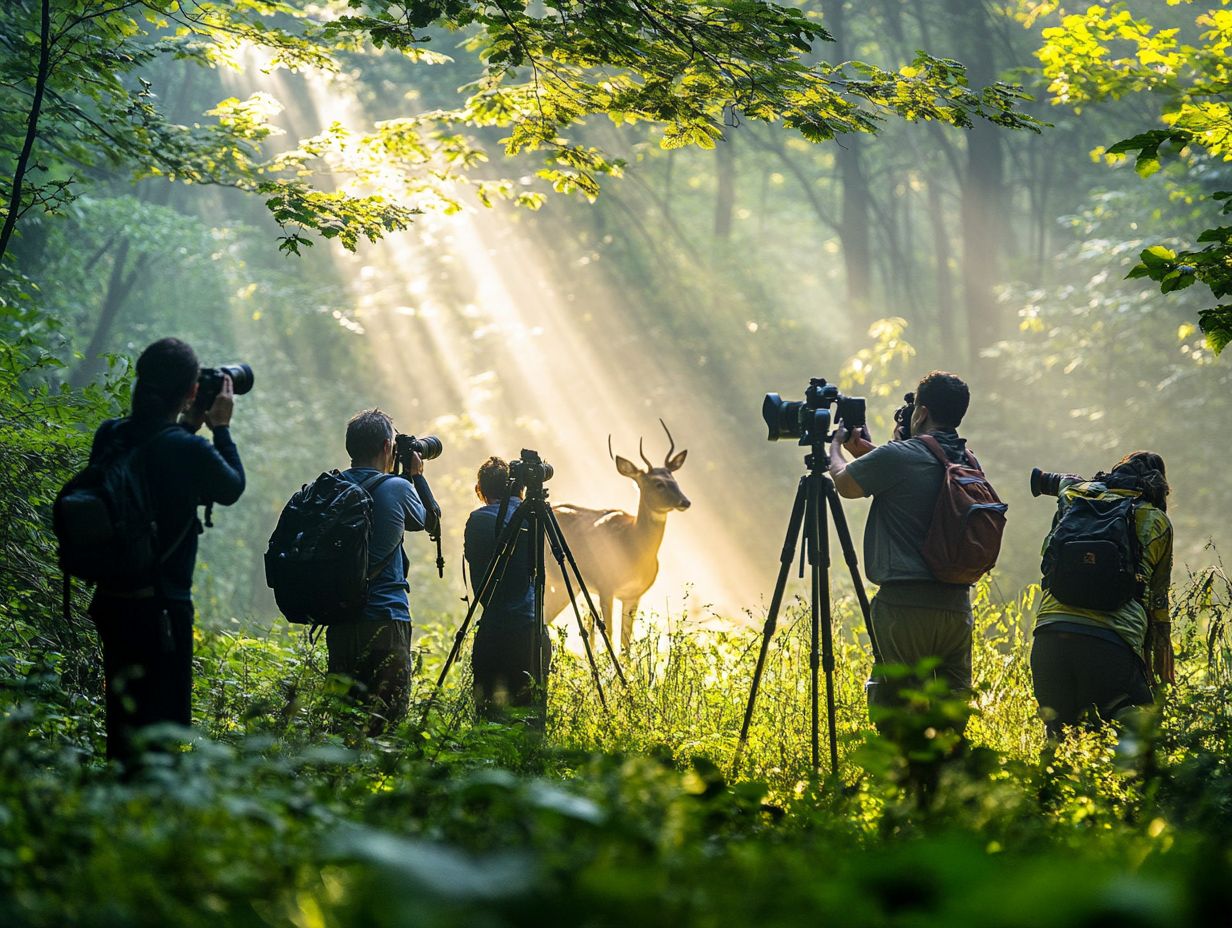
After the workshop, a new challenge awaits: apply the techniques you’ve mastered. Translate your skills into practice as you embark on outdoor photography adventures, capturing stunning wildlife images that showcase your unique vision.
Master New Wildlife Photography Techniques
Implementing new techniques and insights gained from a wildlife photography workshop can elevate your skills, transforming your approach to wildlife photography and camera settings.
But it s not just about honing your skills; mastering the adjustment of camera settings for different lighting conditions is crucial. For instance, increasing the ISO, which measures the camera’s sensitivity to light, during those serene early morning shoots or reducing the shutter speed, which controls how long the camera sensor is exposed to light, under the harsh glare of midday sun can lead to breathtaking results.
Don’t shy away from experimenting with composition and style. Using the rule of thirds or leading lines can effectively draw attention to the animal’s habitat, highlighting the intricate relationship between wildlife and their environments. This thoughtful approach not only results in stunning images but also weaves a compelling narrative about the delicate balance of ecosystems and the critical need to preserve these natural habitats. Understanding animal behavior enhances your photography.
Are you ready to elevate your skills and capture remarkable wildlife photos?
Sharing your work and seeking feedback from the photography community is crucial for your growth after attending a wildlife photography workshop. It s an opportunity to refine your skills and gain valuable insights into your wildlife images.
Platforms like social media and specialized photography forums serve as excellent venues for showcasing your wildlife photography, allowing you to reach a broader audience that truly appreciates the nuances of responsible photography. Engaging with fellow photographers fosters a sense of community and invites constructive criticism, which can be incredibly beneficial for honing your craft.
By posting your work in these settings, you open yourself up to diverse perspectives and discussions that deepen your understanding of wildlife imagery. Connecting with others who share your passions can lead to collaborative opportunities, reinforcing your commitment to responsible practices and community engagement. Attending wildlife tours can also enhance these experiences. Are you excited to connect with others?
Frequently Asked Questions
What is a wildlife photography workshop?
A wildlife photography workshop is a specialized program that provides hands-on training and guidance for photographers who want to improve their skills in capturing images of wildlife in their natural habitat, including wildlife photography tips for beginners.
Who can attend a wildlife photography workshop?
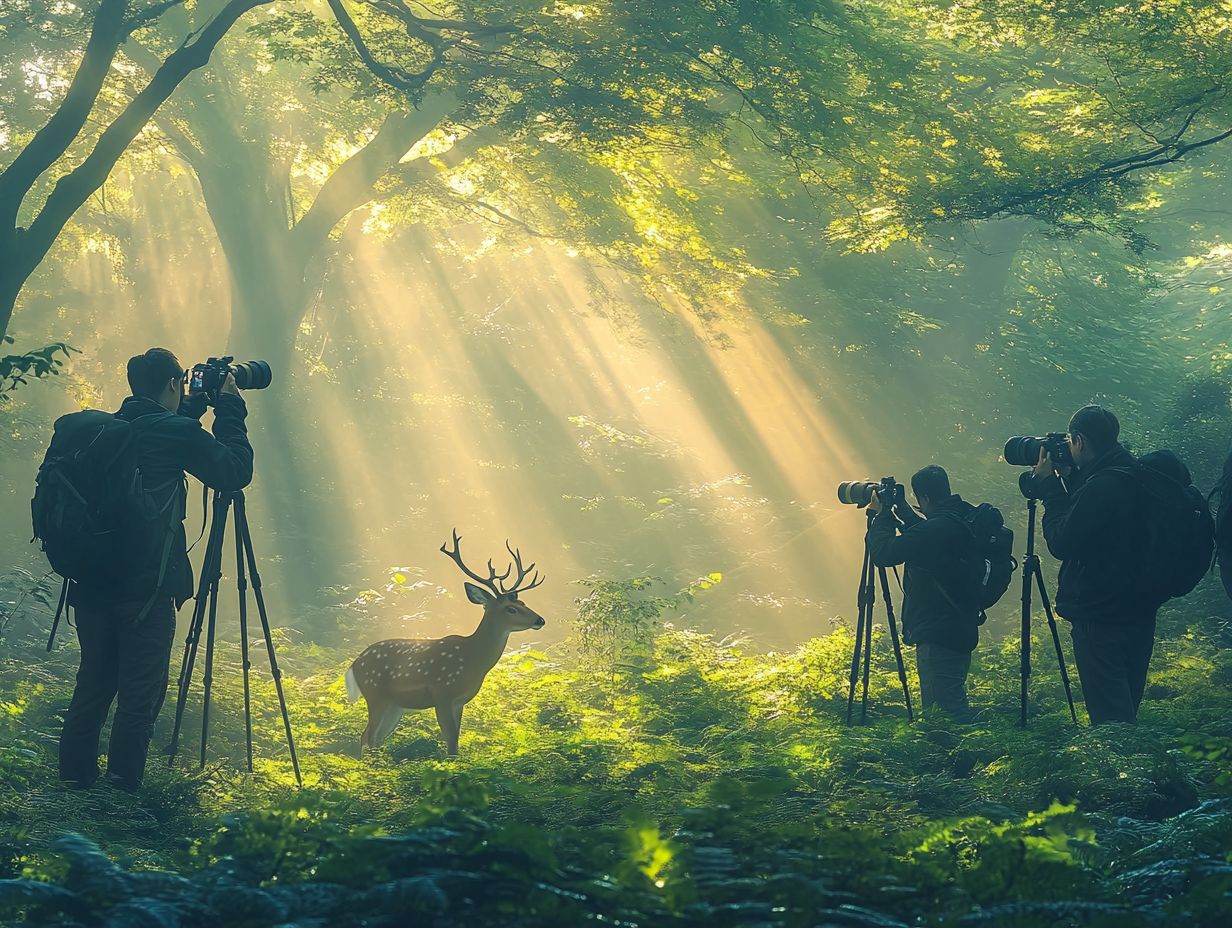
Anyone with a passion for photography and a love for wildlife can attend a wildlife photography workshop. Whether you are a beginner or a professional, these workshops cater to different levels of experience.
What can I expect to learn in a wildlife photography workshop?
You’ll learn how to capture stunning wildlife photos by mastering equipment selection, composition, lighting, and editing techniques.
Do I need to have expensive gear to attend a wildlife photography workshop?
No, you do not need to have expensive gear to attend a wildlife photography workshop. While having high-quality gear can enhance your images, many workshops provide rental equipment, and instructors can also teach you how to make the most out of your current gear.
Are wildlife photography workshops only for photographers?
No, wildlife photography workshops are not only for photographers. These workshops are also suitable for nature enthusiasts who want to learn how to capture beautiful images of wildlife or simply appreciate the beauty of nature.
How do I choose the right wildlife photography workshop for me?
When selecting a wildlife photography workshop, consider your level of experience, the cost, location, and the instructor’s credentials. It is also helpful to read reviews and ask for recommendations from fellow photographers or nature enthusiasts.
